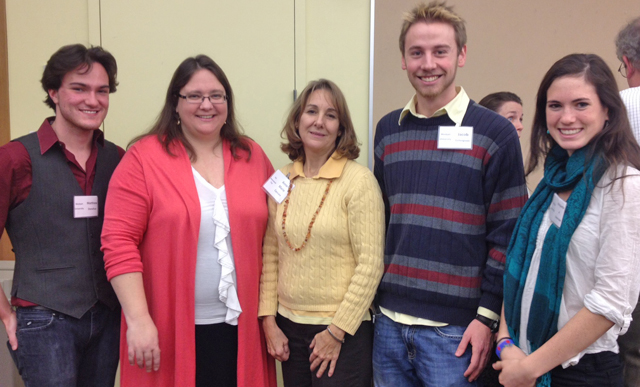Money and Social Change Class Awards Grants to 4 Non-Profits

As their “Money and Social Change” class drew to a close in mid-December, 15 Wesleyan students and their professor presented four local non-profit organizations with a surprise gift for the holidays: $10,000 in unsolicited grants.
The funds were provided to the class by the Learning by Giving Foundation, established in 2011 by Doris Buffett, Warren Buffett’s oldest sister. The foundation aims to promote the study of the nonprofit sector and philanthropy by undergraduate students, giving them first-hand experience in “the art, science and business of philanthropy.”
This year for the first time, Wesleyan partnered with the foundation through the service learning course, “Money and Social Change: Innovative Paradigms and Strategies,” taught by Visiting Assistant Professor of Public Policy Joy Anderson ’89. The course is part of the Center for the Study of Public Life. Anderson leads the Haddam, Conn.-based Criterion Institute, a think tank centered around shaping markets to create social and environmental good.
According to Anderson, the course asked students to explore the question, “How do you use money to change the world?”
At the beginning of the semester, the students were assigned to articulate their own theories of how change happens. Then, said Anderson, “Over the course of the semester, they refined that theory of change. For some of the students, it was quite a dramatic discovery process.”
The students examined case studies of successful social ventures, philanthropy and impact investing. They surveyed 400 greater Middletown-area nonprofits, and went through a long and difficult process of winnowing down the list of potential recipients. They initially chose 75 organizations that seemed worthy of consideration and developed a profile for each with information such as its core programs, community collaborations and partnerships, revenues, expenses, and funding sources.
Then, during a four-hour-long “marathon session,” the class brought the group of contenders down from 75 organizations to 8 through a multi-round elimination process. The night ended in consensus conversations, in which the students sought to agree upon, “What do we want to communicate as a class through these grants?” The list was ultimately whittled down to four worthy nonprofit organizations that received grants. The students decided to grant $7,000 to the Rockfall Foundation, and $1,000 each to the North End Action Team, The Buttonwood Tree, and the Multicultural Leadership Institute. All are based in Middletown, except the Multicultural Leadership Institute, which does work in Middletown. The organizations were notified that they had been selected, and a reception was held at Wesleyan on Dec. 11 to present the grants.
Anderson said of the class’ decision making process, “At some levels, they learned how hard grant making is. Lots of organizations do good work. How do you decide which one needs your money now? How do you make those choices? More importantly, how do you come to agree with people who don’t share your personal theory of change about where this money should go? In the end, there were compromises, lots of side conversations, and proposals from different parts of the class. It was very collaborative.”
Matt Donahue ’14 said, “Professor Anderson tortured us, but in a good way; she forced us to look beyond ourselves, to push our theories of change into reality and engage in critical dialogue both in and out of the classroom regarding how money can catalyze change.”
“Over the course of the semester, working with Professor Anderson, we covered everything from basic finance terms to new types of social entrepreneurship,” said Grace Powell ’14. “For me, the best part of the class was getting to learn about organizations in our community at the same time as I learned about the money side of NGOs. I’m really proud of what we decided to do with our grant at the end of the semester.”
The Learning by Giving Foundation’s mission is to equip undergraduate students with the skills and insight to pursue long-term philanthropic work. Anderson notes that her students, like many at Wesleyan, “see their role in changing the world, and have hopes and fears about what they might get done. I think this class was really a concentrated experience in sorting through how they think about that.” For example, many students vacillated between a belief that simple actions to improve the world really matter and the general cynicism that the political and economic systems are broken beyond repair by individual actors. And at the beginning of the class, one student almost sheepishly expressed his theory that durable, lasting change can only result from people acting in their own self-interest. By the end, he felt comfortable that rather than being a greedy, capitalist belief, this was a realistic viewpoint that is shared by many smart people who have used that perspective to change the world.
Any lasting impact on the students from the course will be seen in years to come. In the near-term, two students from the class will intern at Anderson’s Criterion Institute this spring.

